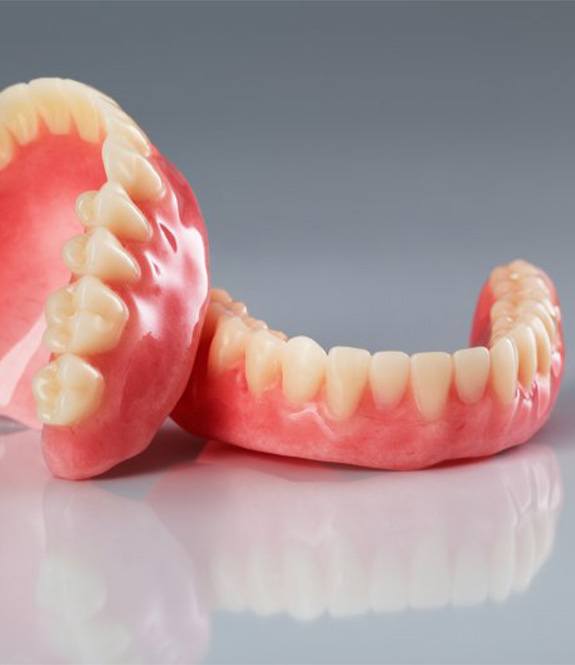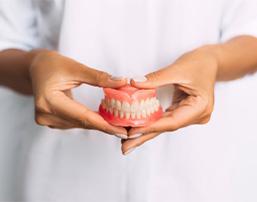Information?

The last thing you can expect at Brush Dental is a bulky and obvious full or partial denture. Our dental office’s prosthetics are designed with comfort and sleekness in mind, so you can look and feel like someone who never lost their teeth to begin with! The dentist will walk you through the process for creating a denture step-by-step, making sure that your final result leaves you feeling incredibly confident and secure with your smile. Whether you need to replace a few teeth or all the teeth in a single arch, you can learn how we do it by calling us today for a consultation to discuss dentures and partials in Royse City, TX!


Wondering whether dentures in Royse City are the right choice for you? At Brush Dental, we do our best to match each of our patients with the tooth replacement options that will best fit their lifestyle and desires, but the only way we can do that is if you visit us for a consultation! Based on what you tell us, along with an in-depth evaluation of your situation, we’ll be able to outline all of your reconstructive options for you, which may include full or partial dentures.

Missing teeth don’t just cause aesthetic concerns that can wear on your self-confidence—they can also lead to functional and other oral health problems down the road. Each part of your tooth’s structure serves a specific and important purpose, like the roots of teeth providing crucial blood flow and stimulation to the jawbone to keep it from deteriorating. By replacing your missing teeth with implant dentures or other prosthetic designs, you can avoid some of these common issues associated with missing teeth:
In short, missing teeth may seem like a purely aesthetic problem, but in reality, this oral health concern can lead to grave impacts on your psychological and physical health.

We typically recommend dentures for patients who:

Depending on the location of your missing teeth and your individual smile restoration goals, you may benefit from any of the following alternatives to traditional dentures:

Most people think of full dentures when they hear the word “denture” uttered in just about any context. This prosthetic is mainly designed to replace entire rows of teeth at a time. Furthermore, full dentures make it much easier to chew certain foods and add height to your face. This makes it appear healthier and more youthful in appearance. Plus, it can make your bite more aligned, which prevents strain on the jaw joint as well as pain in the face, head or neck. Typically, this sort of denture sits on the gums and is held in place with natural suction. A small amount of denture adhesive can also go a long way.

If you have healthy remaining teeth, there’s always a partial denture option as well that works to fit in between your healthy teeth with relative ease. Each denture is made from acrylic teeth and attached to a gum-colored base, which is formed into the exact shape of your mouth. This is then held in place with metal clasps that wrap around nearby teeth. By using a partial denture, you can preserve the rest of your teeth as they work in tandem with your custom-made prosthetic. If you want a strong and reliable smile moving forward, you’ll want to consider partial dentures.

If you’re interested in getting dentures, it’s understandable that you might be curious about how they are made. At Brush Dental, we use high-quality materials and trusted manufacturing partners to ensure that your restorations will look great, function well, and fit comfortably. Here’s a brief guide to how we create highly customized prosthetic dental appliances so you can enjoy having a full smile again, but please contact our office if you have any more questions.

Dentures consist of two parts, those being the base and the teeth. Here’s an overview of each of these components:
The base supports the artificial teeth and holds the appliance securely in the mouth, and it can be made from materials such as acrylic, nylon, porcelain, metal, and resin. We usually make full dentures out of acrylic because it can be easily matched with your natural gum tissue. The bases of partial dentures often incorporate metal clips that allow them to connect with your natural teeth for a secure fit.
The artificial teeth are usually made from porcelain to create a strong, durable, and functional smile. However, porcelain can be abrasive enough to injure neighboring teeth, so we may use another material for the crowns mounted on partial dentures.

Each denture is customized to fit the individual patient’s mouth through a special multi-step process.
Step 1: Our dentist will take impressions of your upper and lower gums using a special paste. These impressions will be used to create a plaster model of your mouth so we can ensure your final appliance is the right size and shape. We may also measure your jaw during this step.
Step 2: This plaster model will be sent to a dental laboratory where a skilled technician will create a wax replica of your gumline.
Step 3: Artificial teeth made from acrylic resin will be placed in the wax replica using a device called an articulator. The technician will then make adjustments to ensure the replica looks like your gums.
Step 4: These wax dentures will be sent back to our office so you can try them on. After you approve them, they’ll be sent back to the lab so they can be finalized. You’ll also receive a temporary set of dentures to wear while your permanent appliance is under construction.
Step 5: Back at the lab, the technician will remove the wax portions of your dentures by boiling them in a flask. The removed parts will be replaced with plaster.
Step 6: Holes will be made in the teeth so they can attach to the denture material and a liquid separator will be added to the plaster to prevent the acrylic that is then injected into the flask from sticking.
Step 7: The plaster will be carefully removed with special tools, revealing the dentures. The appliance will then be placed in an ultrasonic bath to eliminate any remaining plaster.
Step 8: Any excess acrylic will be trimmed from the denture before it is polished to perfection.

It’s normal for patients to need some time to get used to their new dentures. While you may experience some soreness and have difficulty when chewing and speaking at first, these issues will gradually diminish as your mouth grows accustomed to your new appliance. Eventually, your dentures should feel like natural teeth, but, if you wish to speed up this acclimation process, you can try sticking to a soft diet, exercising your facial muscles, or experimenting with an adhesive. However, please contact our office in Royse City if these problems persist, as we may need to make adjustments.

Between having no teeth at all and completely restoring your smile with dentures, the latter is obviously the much more attractive choice. The fact of the matter is that there are many ways that dentures can make your life significantly better following extensive tooth loss. Are you still trying to decide whether to pursue the process of getting dentures? Below is a brief look at many of the benefits that this time-tested tooth replacement option has to offer.

While the physical consequences of missing teeth are easy enough to observe, the psychological effect they can have should not be overlooked. Social anxiety, depression, and a lack of confidence are all closely associated with missing teeth. However, dentures allow you to enjoy a complete grin again, thus helping you feel much better about yourself and your appearance. This can make a significant difference in the way that you interact with others.

Normally, you might not think twice about the role your teeth play in speech, but you’ll certainly come to appreciate their importance once you try enunciating with an incomplete smile. Losing certain teeth can lead to you having increased difficulty being understood by others, which can be a major problem in your professional and personal lives. However, once the empty space in your grin has been completely filled by dentures, you will once again be able to correctly make the sounds necessary to pronounce certain words.

Trying to enjoy a varied diet without teeth can be very difficult. You’ll most likely be limited to only eating soft or liquid foods, which means you will have fewer options for getting the nutrients that your body needs to stay healthy. On top of that, if you’re unable to chew your food properly, you may suffer from poor digestion.
Dentures don’t just restore your smile; they also restore your ability to chew all kinds of foods. You will once again be able to enjoy various meals without issue, which is ultimately good news for the overall health of your body.

Losing a tooth is obviously a serious oral health issue in and of itself, but it can lead to further consequences as well. When there’s empty space in your smile, your remaining teeth will start to drift toward it. Ignoring this problem for too long can increase your risk of additional tooth loss. But if you make a point of filling in the gaps in your grin with a denture as soon as possible, you can avoid dental drift.

Do you have an important job interview coming up? Do you need to give a presentation at work? Are you planning on going to an important social event in the near future? Dentures can help you make a better first impression when it counts the most by restoring your smile in a natural-looking way.

After learning about dentures, you’re probably more excited than ever to start rebuilding your smile. However, you may be wondering about the cost of dentures in Royse City before you decide to move forward with the process. During your consultation, our team at Brush Dental will conduct an oral examination and explain which factors will affect the final price. Following the appointment, you’ll have a better understanding of what you can expect to pay for your treatment.

Multiple considerations can influence the price of dentures in Royse City, including:
Is cost a priority? If so, you may be tempted to opt for cheaper dentures. Even though the upfront cost is certainly lower, they tend to break easily and require replacement much sooner than you’d expect. That’s why quality should always be of utmost importance, regardless of the cost.

Yes, implant dentures are generally more expensive than traditional ones. However, there’s a good explanation for that. They require oral surgery and the placement of multiple dental implants, making them more reliable for everyday use since they do not shift out of place. Many patients discover this method of tooth replacement is well worth the investment because of several tremendous benefits.
Not only do implants stimulate the jawbone, but they can last decades or even a lifetime with proper care and maintenance with help from your denture dentist in Royse City. That means you won’t have to worry about replacing your dentures nearly as often!

Dentures are considered a major procedure which is why most dental insurance plans will cover approximately 50 percent of their cost. Certainly, every policy is unique, meaning the amount of coverage provided will vary from patient to patient. If you have any questions about your plan, contact your insurance provider or ask our dental team for assistance. We will gladly review the details of your policy and do everything possible to maximize your benefits and reduce out-of-pocket expenses.

We understand not everyone has dental insurance which is why we offer another avenue to make your dental bills much easier to manage. With CareCredit Financing, you can split up the total cost of your treatment into smaller, budget-friendly monthly installments. Options even come with little-to-no interest!
Also consider our 12-month, in-house dental plan which provides 30 percent off all treatments, as well as a number of services at no extra charge.
Ready to begin down the path to a beautiful, complete smile? Contact us today to schedule a consultation so we can answer any questions you might have.

After you replace all of your teeth with dentures, you may think you’re done with dental checkups and cleanings. In truth, though, visiting your dentist is just as important as ever. Even if there are no longer any teeth that can get cavities, you still need to protect your smile from gum disease. Also, your dentist might catch signs of oral cancer before you do.
Additionally, once you get dentures, you should learn how to take care of them so that you don’t need to replace them sooner than you planned. Read on to learn more about the basics of denture maintenance.

Little bits of food can get stuck on your dentures while you’re chewing, and bacteria can build up on your artificial teeth throughout the day. To maintain proper oral hygiene, you need to take off your dentures after every meal or snack so that you can rinse them. Double-check the water to make sure that it’s not too hot; exposure to heat can cause your dentures to change shape, and as a result, they might not fit anymore. When you’re done rinsing, examine your dentures carefully to make sure there aren’t any spots you missed.
Even with regular rinsing, you will occasionally need to brush your dentures to keep them as clean as possible. Toothpaste is too abrasive for the job, so try mild dish soap instead. You can also look for specialized denture cleansers at the drugstore or grocery store.
Sometimes you might not be planning to put your dentures back in your mouth right away after cleaning them; this is usually the case if you’re getting ready for bed. Keep them immersed in a denture cleansing solution so that they don’t dry out.
Dentures must be handled carefully at all times. Make sure that they’re always out of reach from your children or any pets you might have. Also, you need to exercise caution when taking them out of your mouth; put a soft object like a towel below you in case you drop your dentures by accident.
You shouldn’t wear your dentures for 24 hours a day. Doing so is bad for the soft tissues in your mouth, and research shows that it could increase your personal risk of pneumonia. As such, you need to remember not to go to bed until you’ve first taken out your dentures and placed them in a soaking solution. In the morning, don’t forget to rinse them off before you put them back in your mouth.
If you notice any changes with your dentures or your mouth, it could mean there’s a problem. Take note if:
Based on your symptoms, we can discuss potential next steps, like getting a new denture.
Modern dentures have come a long way since the days of George Washington’s famed wooden teeth. These days, if you get dentures in Royse City, you can trust that your new smile will look almost exactly like the pearly whites you once had. Other people shouldn’t even be able to tell the difference! That said, you may still have some apprehensions before beginning the denture process. For your convenience, we’ve included the answers to a handful of frequently asked denture questions below.
After a consultation with one of our dentists, getting a traditional partial or full denture will typically take several appointments over the course of a few weeks or months. It may take longer if you need preparatory work such as tooth extractions or gum disease therapy. Once your mouth is healthy, we’ll take an impression of your mouth that is used to create your denture. We’ll have you try it on a few times, making adjustments accordingly until it perfectly fits your mouth.
Getting an implant denture tends to take longer, as you’ll have to wait for the implants to fuse with your jawbone before receiving your new teeth. However, their long-term benefits and added security make them worth the wait.
The jawbone naturally changes shape after teeth are lost. As a result, even the most well-made traditional full or partial denture will need to be adjusted every year or two, and replaced entirely after five to seven years on average.
Implant dentures usually last much longer. Dental implants stimulate the jawbone, helping it maintain its original strength and shape after tooth loss. While the denture itself might have to be replaced every 10 years or so, the implants could potentially last a lifetime as long as you practice good oral hygiene.
This answer also depends on whether you have a traditional or implant denture. If you have an implant denture that is fixed in your mouth, you can essentially brush and floss it just like you would natural teeth.
A traditional partial or full denture requires slightly more maintenance. Since regular toothbrushes and toothpastes can be abrasive, we recommend investing in a toothbrush and other cleaning solutions specifically designed for dentures. Every morning and night, you should gently brush your tongue, gums, and dentures to prevent bacterial buildup. Overnight, let your dentures soak in a glass of room-temperature water (hot water could warp their shape) or denture cleanser.
It may take a few weeks to fully adjust to eating while wearing dentures. After that, you should have no problem enjoying your favorite foods. Until then, it may help to cut up your food into bite-size chunks and/or follow a mostly soft food diet before working your way up to heartier foods. As you’re chewing, be sure to apply even force on both sides of your mouth to keep the denture in place. Applying a small amount of denture adhesive can also help to stabilize them.
